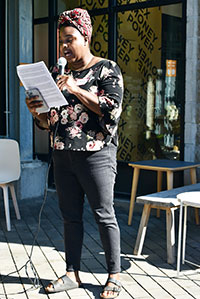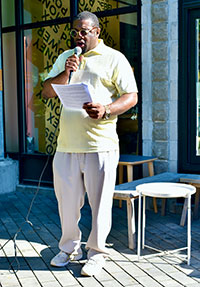
Kyera Singleton the project scholar for the Somerville Museum’s Reading Fredrick Douglas Together event reading from “The Meaning of the Fourth of July for the Negro Abridged.”
By Mina Rose Morales
The Somerville Museum helped their community celebrate the Fourth of July with Fredrick Douglas at the Bow Market on Thursday, June 30.
“I’m so happy you decided to spend this beautiful day with us to celebrate the words of Frederick Douglas,” said Kyera Singleton, the project scholar for the Somerville Museum’s Reading Fredrick Douglas Together at Bow Market event, during the introduction of the event.
The Reading Fredrick Douglas event is annual. This is the fourth year the Somerville Museum has hosted it since 2019. Mass Humanities provided the grant for the event.
Alison Drasner, the assistant director of the Somerville Museum, said it would be a great opportunity to have a conversation in Somerville about Frederick Douglass’ famous address, “What to the Slave is the Fourth of July?”

Audience member Cedric Arno reading from “The Meaning of the Fourth of July for the Negro Abridged.”
“I thought this conversation wasn’t something the museum had been overtly involved in, as the mirror of the city, this conversation was important to have. It’s pretty simple, really,” said Drasner, when asked about why she organized the event.
At the beginning of the event, Singleton discussed words people think of when they think of the Fourth of July: independence, liberty, freedom, and equality. She stressed the Fourth of July was not a moment of independence for Black people in America. She asked the audience to reflect on what justice and equality means in this country and reminded the audience to think about recent occurrences such as white supremacy, anti-Asian violence, police violence, and most recently reproductive justice. The diverse crowd agreed in unison.
During the reading of the “The Meaning of the Fourth of July for the Negro Abridged,” participants lined up to each read a paragraph from Douglass’ famous address. Some audience members lined up multiple times to read more than one paragraph. The address was numbered up to 53 paragraphs.
“What, then, remains to be argued? Is it that slavery is not divine; that God did not establish it; that our doctors of divinity are mistaken? There is blasphemy in the thought. That which is inhuman, cannot be divine! Who can reason on such a proposition? I cannot. The time for such argument is past,” read Cedric Arno with aggressive ardor who attended the Reading Fredrick Douglas event at Worcester earlier that day.
After the reading, Singleton asked the audience the following questions: What does the Fourth of July mean to you? How does Douglass’ speech challenge the myth, meaning, and memories of the holiday? How might you come to understand the Fourth of July differently? How does Douglass’ speech suggest that black lives matter? How might you reclaim the Fourth of July?
Once the questions were discussed, the event ended, but not before being reminded by Latasha Hughes Thomasson, a comedian and an audience member, that because of recent national political events it was a sad week, and recommended audience members who did not participate to have the courage to read a paragraph for the next Reading Fredrick Douglas Together event.















Reader Comments